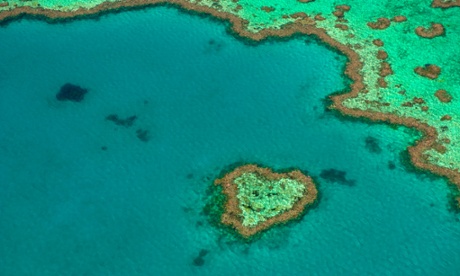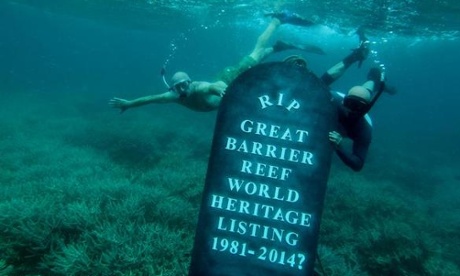The head of Unesco has praised the Albanese government for making new commitments to protect the Great Barrier Reef, signalling Australia could avoid seeing it being placed on a list of world heritage sites in danger.
Unesco’s director general, Audrey Azoulay, was commenting on a letter from the environment minister, Tanya Plibersek, that outlined new commitments to improve water quality and reduce the stress from commercial fishing over the reef.
Sign up for Guardian Australia’s free morning and afternoon email newsletters for your daily news roundup
In the letter last week to Azoulay, seen by Guardian Australia, Plibersek asked for confirmation Australia had done enough to satisfy Unesco’s concerns, which included a recommendation last year from a monitoring mission that the reef should be placed on the “in-danger” list.
Azoulay said there had been a year of dialogue between Australia and Unesco, with the country making commitments against 10 “high priority recommendations” delivered by the UN-backed monitoring mission.
“The Great Barrier Reef is fragile jewel of world heritage,” Azoulay said. “For many years, Unesco has not ceased alerting the world to the risk of this site losing its universal value forever.
“We have proposed several concrete measures which provide a roadmap for tackling the problem. I am delighted that the dialogue between our experts and the Australian authorities has now resulted in a set of formal commitments.”
In the letter, Plibersek outlined the government’s commitments on improving water quality, fisheries reforms and “strong, legislated climate action” that aimed to address the concerns of Unesco’s experts.
This week the Albanese government announced a $160m plan to phase out commercial gillnet fishing on the reef and to accelerate fisheries reforms in Queensland – one of the areas of concern.
The world’s biggest reef system will be reviewed again by the world heritage committee at its next meeting in September, hosted by Saudi Arabia.
Before that meeting Unesco is due to publish a “state of conservation” report on the reef that will recommend whether it should be placed on the in-danger list – a test of whether the Albanese government has done enough to satisfy Unesco.
In November last year a report from a 10-day UN-backed monitoring mission to Queensland concluded the reef should be placed on a list of world heritage sites in danger.
But the report also listed 10 “high priority recommendations” and said their “rapid implementation” could “drastically improve” the reef’s fortunes and retain its unique features for future generations.
The UN monitoring mission took place under the former Morrison government but its report was released after Anthony Albanese led Labor to power.
One of those recommendations was for Australia’s cornerstone Reef 2050 plan to include “clear government commitments to reduce greenhouse emissions consistent with the efforts required to limit the global average temperature increase to 1.5°C above pre-industrial levels.”
Since then, the Albanese government has legislated a target to reduce emissions by 43% by 2030, based on 2005 levels. Analysts have said the target, while an improvement on the Morrison government’s, is not in line with keeping global temperatures to 1.5C.
Unesco has long held concerns that targets to reduce pollution running into the reef’s waters from farming were not being met. In the letter to Azoulay, Plibersek writes that $1bn of investment to 2030 to cut pollution would put the reef “on a solid pathway” to “full ecosystem health” by 2050.
A Unesco official said there had been an open exchange between Unesco, its experts and the Australian government since the mission report was published.
Plibersek met Unesco officials in Paris last week, where it is understood she presented the government’s latest commitments to improve water quality and reduce the stress on the reef from unsustainable fishing, and outlined Australia’s new climate change targets.
The UN mission came after the Morrison government furiously lobbied members of the world heritage committee in 2021 to ignore an official Unesco recommendation the reef be placed on the in-danger list.
Climate change is seen as the greatest threat to the health of the reef. Widespread mass bleaching of corals on the reef – caused by rising ocean temperatures – was first seen in 1998, and happened again in 2002, 2016, 2017, 2020 and 2022.











